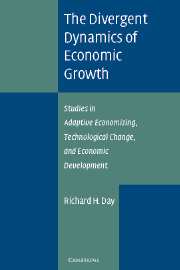 The Divergent Dynamics of Economic Growth
The Divergent Dynamics of Economic Growth Book contents
- Frontmatter
- Contents
- Preface
- Acknowledgments and Comments
- 1 The Adaptive, Evolutionary Theory of Divergent Economic Growth
- PART ONE GLOBAL TRENDS AND ADAPTIVE ECONOMICS
- PART TWO TECHNOLOGICAL CHANGE IN AGRICULTURE AND INDUSTRY
- PART THREE EPOCHAL DEVELOPMENT
- 8 Economic Development and Migration
- 9 Instability in the Transition from Manorialism
- 10 Do Economies Diverge? Economic Development in the Very Long Run
- PART FOUR TOWARD A GENERAL THEORY OF DEVELOPMENT
- Index
10 - Do Economies Diverge? Economic Development in the Very Long Run
Published online by Cambridge University Press: 08 August 2009
- Frontmatter
- Contents
- Preface
- Acknowledgments and Comments
- 1 The Adaptive, Evolutionary Theory of Divergent Economic Growth
- PART ONE GLOBAL TRENDS AND ADAPTIVE ECONOMICS
- PART TWO TECHNOLOGICAL CHANGE IN AGRICULTURE AND INDUSTRY
- PART THREE EPOCHAL DEVELOPMENT
- 8 Economic Development and Migration
- 9 Instability in the Transition from Manorialism
- 10 Do Economies Diverge? Economic Development in the Very Long Run
- PART FOUR TOWARD A GENERAL THEORY OF DEVELOPMENT
- Index
Summary
…there are no examples so frequent in history as those of men withdrawing from the community they were bred up in, and setting up new governments in other places; from whence sprang all the petty commonwealths in the beginning of ages, and which always multiplied, as long as there was room enough, till the stronger or more fortunate swallowed the weaker; and those great ones again breaking into pieces, dissolving into lesser dominions. (paraphrased)
John Locke, Two Treatises on Government 1690…for time does not stop its course for nations any more than for men; they are all advancing towards a goal with which they are unacquainted.
Alexis de Tocquiville, Democracy in America 1832Our purpose here is to describe and illustrate in the simplest possible way a multiple-phase theory of economic growth and development that helps explain why human evolution has not been characterized by steady progress but by fluctuating growth and changing forms, sometimes progressing to higher levels of complexity and sometimes reverting to earlier stages of organization. In the form outlined here (in terms of macroeconomic growth theory) it is convenient to think of the analysis as involving the “very long run.” But for reasons that will be suggested in the conclusion, the very long run is of great interest for interpreting events in the “very short run,” in particular the processes of integration and disintegration currently at work in the world.
- Type
- Chapter
- Information
- The Divergent Dynamics of Economic GrowthStudies in Adaptive Economizing, Technological Change, and Economic Development, pp. 178 - 200Publisher: Cambridge University PressPrint publication year: 2003


